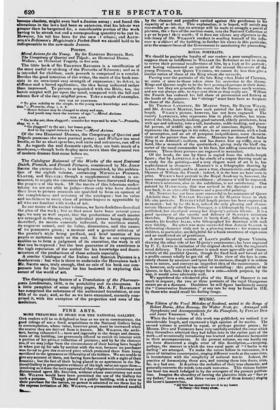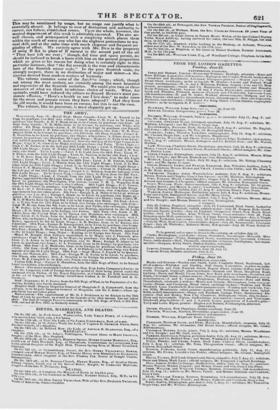MUSIC.
New Edition of the Vocal Melodies of Scotland, united to the Songs of Robert Burns, Allan Ramsay, Sir Walter Scott, Ore. Arranged with Symphonies and Accompaniments for the Pianoforte, by FINLAY DUN and JOHN THOMSON. Vol. IL When the fitst volume of this work was published, we noticed it at considerable length, and expressed a high opinion of its merits. The second volume is entitled to equal, or perhaps greater praise; for Messrs. DUN and THOMSON have very carefully avoided the error which they themselves admitted they had fallen into in the earlier part of the work—of oecasionally introducing too learned and elaborate hermonies in their accompaniments. In the present volume, we can hardly say we have discovered a single error of this description,—excepting, perhaps, the manner in which the two vocal parts of " Charlie is my durling" are arranged. To make the voices follow in succession, in a piece of imitative counterpoint, singing different words at the same time, is inconsistent with the simplicity of national music. Indeed, the practice of harmonizing these airs, and turning them into duets, trios, Ike. is a bad one. It deprives the melodies of their true character, and generally converts the words into stark nonsense. This vicious fashion has been too much indulged in by the arrangers of the present publica- tion. Imagine tele absurdity of turning the plaintive little air" Saw ye my father," into a trio, and three voices (two of them female) singing the lover's larnentstion,
'I' All that has wised this wmck to may bosom
,oaay—fair busy Mum
This may be sanctioned by usage, but no usage can justify what is essentially absurd. It belongs to men of distinction and authority to correct, not follow, established errors. Upon the whole, however, the musical department of this work is admirably executed. The airs are well chosen, end accompanied with a simplicity which places them within the reach of every one who has the slightest pretensions to mu. sical skill, and at the same time with much elegance and frequent on ginality of effect. We entirely agree with Mr. DON in the propriety of using B flat in place of B natural in the second part of the air "Thou hest left me ever ; " though, did time and space permit, we should be inclined to break a lance with him on the general proposition which ne gives as his reason for doing what is certainly right in this particular instance, that " the flat seventh is the true und characteristic note of the Scottish minor scale." In the pure Scottish scale, we strongly suspect, there is no distinction of major and minor—a dis- tinction derived from modern notions of harmony. The volume contains some of the Jacohlte songs ; which, though not among the most ancient, are certainly among the most beautiful and expressive of the Scottish melodies. We could give two or three instances of what we think in'udicious choice of words. What, for example, could have induced the editors to discard BURNS'S most pas- sionate effusion, "Here's a health to ane I lo'e dear," to make room for the mean and prosaic verses they have adopted ? Had they been the old words, it would have been an excuse, but this is not the case.
The volume, like its precursor, is most elegantly got up.



























 Previous page
Previous page